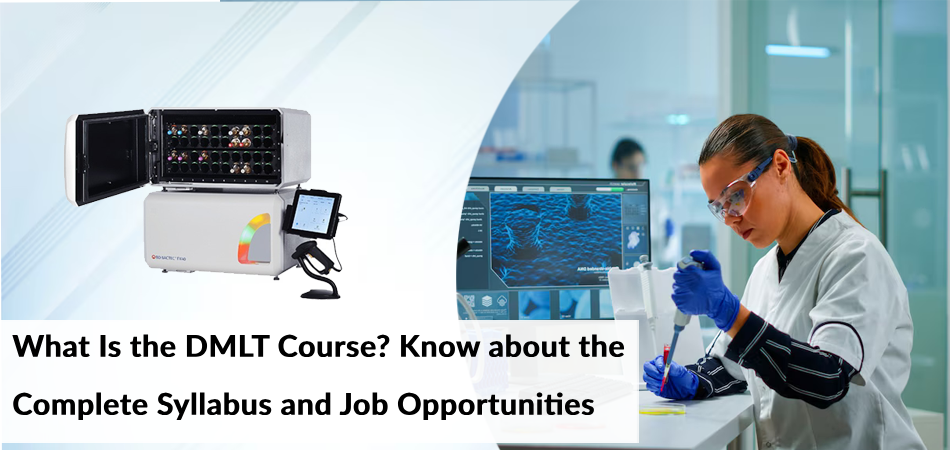
DMLT stands for Diploma in Medical Laboratory Technology is a 2-year diploma course. DMLT students mainly deal with Laboratory and blood collection. In the laboratory, DMLT candidates perform all types of blood tests and body fluid tests. DMLT candidates can also become phlebotomists. The main work of phlebotomists is to collect a sample (Blood, Pus swab, body fluid, etc). DMLT course deals with various fields like Laboratories, Diagnostic centres, Pharmacy companies, production, etc.
Candidates should have passed the Higher Secondary(10+2) or equivalent examination from any Indian University or a recognized Board with passing marks in Physics, Chemistry, and Biology.
| Subject title | Subject details |
| Microbiology | Microbiology is the study of microorganisms. This field mainly deals with Viruses, bacteria, fungi, Protozoa, helminths, etc. Some parts of the syllabus are:
|
| Human Anatomy | Anatomy is the study of body structure. Some parts of the syllabus are:
|
| Physiology | Physiology helps in understanding body functions, Anatomy and physiology play a vital role in the laboratory.
Some parts of the syllabus are
|
| Biochemistry | Biochemistry is the study of the chemical substances that occur in humans, plants, and animals of the changes they undergo during development and life.
Some parts of the syllabus are:
|
| Pathology | Pathology is the study of diseases. Pathology provides exact diagnostic information about patients. It also gives you information about the stages of the disease. Pathology is very helpful in diagnosing a disease.
Some parts of the syllabus are:
|
| Subject title | Subject Details |
| Pathology | Pathology is the study of diseases. Pathology is an integral part of the laboratory. It helps to diagnose a disease. Some parts of the syllabus are:
|
| Microbiology | Microbiology is the study of microorganisms. Microbiology mainly deals with different kinds of microorganisms like viruses, bacteria, parasites, Some parts of the syllabus are:
Practical of Microbiology |
| Biochemistry | Some parts of the syllabus are
|
| Anatomy | Some parts of the syllabus are
|
| Physiology | Some parts of the syllabus are
|
| Course Name | Diploma in Medical Lab Technology |
| Course Level | Diploma |
| Course Duration | 2 years |
| Course Type | Semester-wise/ Yearly |
| Eligibility | 12th in science stream with at least 55% aggregate |
| Admission Process | Merit-based / Entrance-exam based |
| Average Fees | 80,000 Per Annum |
| Average Salary | INR 3 to INR 10 LPA |
| Top Recruiting Areas | Government and Private hospitals, Radiology Centers, clinics, medical labs, diagnostic centres, research and development institutes |
| Top Job Positions | As Marketing Executive, Medical Consultant, Medical Technician, Healthcare Administrator, Medical Technologist, Microbiologist, Research Assistant, Laboratory System Analyst etc. |
| Top Recruiters | AIIMS, Max Healthcare, Park Hospital, and many other top institutions in Delhi and all over India |
Enrolling in a DMLT course might lead to a fulfilling career in the medical field. This is viewed as one of the most profitable career options for students who want to opt for this The growing need for paramedical experts is a direct result of the industry's continued growth. Choose Ganesh Paramedical College, the top Paramedical College in Delhi, to become a paramedical health professional necessary for patient diagnosis and treatment in medical facilities. we also provide a BMLT and MMLT course and many other paramedical courses Enrol now
What is a DMLT course?
It is a Diploma in Medical Lab Technology. This course will help you to provide detailed knowledge of the Lab techniques and give many job opportunities to the student.
What are the Career opportunities after completing the DMLT course?
After completing this course you can become a Medical research assistant lab technician, research analyst, Microbiologist, Medical officer etc
What is the average salary to be expected after completing this course?
The average salary ranges from 2.2- 7 lakhs depending upon the post and rank.
How to get an inquiry for this course?
You can contact us at PH No-011-47444444 Call Centre NO-011-47333333, Mobile No-9810183948.
What to see before choosing the Best paramedical college in Delhi NCR?
check their standing, experience, results, placements etc you can Choose Ganesh Paramedical College for the best courses in India.
Do paramedical courses require NEET?
No, NEET is not required for paramedical courses. However, a few colleges might have university entrance exams for students.
Is there any entrance exam for paramedical courses?
Admission to some of the paramedical courses is based on entrance exams. This includes JIPMER, NEET-UG, MHT CET, etc.
How many years is a Paramedical course?
Certificate courses go on for a duration of 1-2 years while degree courses are for 1-4 years.
Is paramedical a good career?
There are ample job opportunities for paramedical graduates and an increasing demand for trained people in these fields.